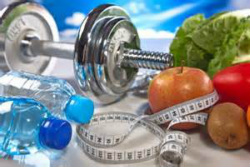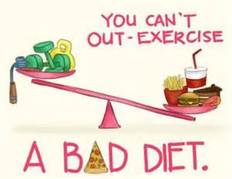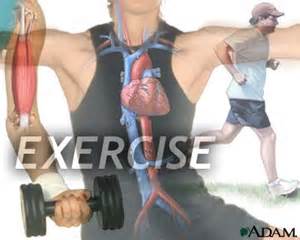Nutrition and Exercise

Why do so many fall off the fitness wagon?
First thing is first, most people who start on an exercise program end up quitting at some point, and there are several reasons as to why that happens. Crash diets (low carbohydrate, low calorie), supplement and caffeine abuse, and overtraining are perhaps the most common causes for abandoning an exercise program, as their long term consequences create exhaustion, nutrient depletion, and even health problems. So why does this happen? Both "fitness experts" and many healthcare professionals will tell their clients that in order to lose fat, one must eat less and exercise more, and it is this advice that eventually leads to the exercise enthusiast's demise when it comes to achieving fitness and weight loss goals. Cutting calories or specific macronutrients (like carbohydrates) while increasing physical activity is the number one route to causing metabolic damage (or slowdown).
Minimizing caloric intake while increasing physical output will do a couple things at a physiological and physical level: remove water and electrolytes from the cells (dehydration, and initial weight loss), burn muscle and fat for fuel (slow metabolism), and deplete nutrient stores (malnourishment). Overtime, this creates adrenal exhaustion, chronic fatigue syndrome, metabolic damage (fat gain), digestive disorders (IBS, constipation), and hormonal imbalances (hypothyroidism, ammenorhea). Without adequate fuel, the body will never recover from any form of exercise, whether its strength training or cardiovascular sessions, so fitness can never be improved upon and actually gets worse as the stress from the exercise continues. The best way to reverse this situation is to consume enough calories on a regular basis and adopt a "smarter vs. harder", consistent exercise routine.

Achieving health and fitness goals are 80% about what you eat. This includes quality, quantity, and most importantly the type of food. Most experts will emphasize quantity, but recent studies indicate that the food itself is more important for health and weight management, regardless of the quantity consumed (www.nutritionfacts.org). Nutrition sources suggest that to maintain a healthy metabolism, a minimum number of calories need to be consumed on a daily basis. The general recommendation for active women is 2400 calories/day minimum and for active men, 3000 calories/day minimum. The majority of people, whether overweight or underweight generally do not consume enough calories to keep their metabolism running properly. On top of that, most people obtain the majority of their calories from fat, as opposed to carbohydrates. It has been shown that the leanest, fittest people in the world come from countries that consume carbohydrates as their main food/fuel source. These include African and Asian cultures who live predominately on corn and rice. Unfortunately, the Standard American lifestyle (SAD), which is based on the consumption of saturated fat, cholesterol, and refined/processed food is infiltrating nations worldwide and causing their rates of obesity, cancer, and heart disease to increase.
In order to maintain long term health and fitness, one will need to keep their metabolism running strong, and that means staying hydrated and consuming adequate calories from the right sources. Mental and physical fatigue is one of the signs of "metabolic drop", indicating that the body needs both water, fuel, and rest in order to keep running efficiently.
The average adult requires a minimum of 3 liters of water/day, and more with physical activity or stress. For an optimized metabolic rate, the majority of food calories should come from plant-based carbohydrate sources (see Carbohydrate post). Plant-based carbohydrates, like fruits and starches (rice, potatoes, corn) provide the main source of fuel (sugar) for all cells of the human body, aid in post workout recovery (including muscle repair), and flood the cells with plenty vitamins, minerals, electrolyes, essential amino acids and fatty acids, fiber, and antioxidants. These vital nutrients also aid the body in waste and fat removal, maintaining adequate hydration, tissue repair, muscle building, and boosting immune function. Plant-based carbohydrate foods are also naturally low in total fat, and contain virtually no saturated fat or cholesterol. The combination of their high carbohydrate and low fat content is ideal for keeping the metabolism high and burning stored body fat.
Many people become concerned about their protein needs when exercising consistently, but the truth is that as long as enough calories are consumed on a daily basis, protein needs are easily met (see Protein post). Green leafy vegetables and legumes are great sources of plant-based protein, as well as many nutrients such as naturally occurring sodium, potassium, vitamin C, vitamin K, essential amino acids and fatty acids, antioxidants, fiber.
Exercise plays an important role in the uptake and utilization of nutrients into the cells of the body, improving its metabolic rate and cellular efficiency. Cardiovascular exercise aids in the removal of toxic waste from the lymphatic system, as well as tones and strengthens the heart, lungs, digestive system, and skeletal muscle by improving oxygen uptake and utilization. Strength training improves overall body strength by utilizing glucose and amino acids to aid muscle building, and enhance both recovery and metabolism. Strength training also helps to protect bones, joints, and ligaments from wear and tear. Breath-focused flexibility exercises, like yoga, increase oxygen intake into the cells, and aid the body's natural detoxification processes by releasing stored toxins from the tissues, joints, and muscles of the body, while building tone and keeping the body limber.
Losing Fat and Building Muscle
Decreasing body fat and increasing muscle mass are the ultimate aesthetic goals most people desire. When it comes to slashing body fat, a high carbohydrate, low fat, calorie sufficient diet combined with regular cardio and resistance training is the ultimate formula. Many people will disagree with a high calorie, high carbohydrate diet for fat loss, but as explained above, a low calorie, low carbohydrate diet leads to metabolic slow down and muscle wastage. The secret behind the high carbohydrate diet is that it's low in fat, creating a fat deficit (as opposed to a calorie deficit) as the fat burned during exercise is not replaced by the diet. While this process may take longer than traditional crash dieting weight loss methods, it results in permanent fat loss. A high carbohydrate, low fat diet also supports a high metabolic rate due to regular fuel and fluid intake, which in turn supports an ever increasing level of fitness.
A high carbohydrate, calorie sufficient diet also supports muscle growth, more so than a high protein diet. Carbohydrates are the main source of fuel for all body cells, but especially muscle cells. Muscle cells have the ability to store up to 2 lbs or 7000 calories worth of sugar in the form of glycogen, which they use for repairing and rebuilding their own structure. For muscle growth, it is more important to focus on consuming enough calories from your favorite plant-based foods, than to focus on protein loading. Protein loading can actually be detrimental to the body as it creates added strain on the kidneys and adrenals due to the high uric acid content.
Ideally it's best to work out on an empty stomach, because you don't want the body to be busy digesting food (which requires energy) while you are training. Too much food or liquid in the system during an intense workout can also cause stomach cramps, or worse! If the exercise session is going to be longer than 1 hour, a small pre-workout snack (like a few dates, some fruit juice, or a banana) 30 minutes to an hour before the workout can provide enough fuel to get through the exercise without fatigue. Any workout less than an hour should not require pre-workout fuel unless adequate fuel has not been consumed the day before or within 3 hours of the workout session. For longer endurance sessions like marathon running or distance cycling, 1 date or a handful of raisins per hour during the exercise can provide adequate repletion fuel without taxing the system. The post-workout meal should be consumed 30 minutes to an hour after the session is completed to re-fuel and restore lost nutrients.
It's also important to stay hydrated before, during, and after exercise, but like with food, you don't want to drink so much before or during exercise that it interferes with the training. Opt for 1/2 to 1 liter of water upon rising, leaving about 10-20 minutes for absorption before training, and drink water as needed during training session, but not so much to cause cramps or sickness. The best time to re-hydrate is immediately after a training session, before the post-workout meal.

Exercise is all about consistentcy. If you want to look like a bodybuilder, you have to train like one. If you want to look like a marathon runner, you have to train like one. Most people have fitness goals that include getting leaner, stronger, faster and becoming more flexible. Developing an exercise plan that meets your fitness goals is the key to achieving those goals and becoming fit long term. If you don't have a current exercise routine, find out what is it physically that you like to do! Go dancing, practice yoga, shoot hoops, ride a bike, do push-ups, or join a gym. The possibilities with exercise are endless, but the key is to have fun while being consistent with your routine. I recommend finding an activity that is challenging but enjoyable, and practicing it a couple times a week. As you become fitter, the exercise will get easier and you can increase the duration and intensity of the activity, or add a new activity! For beginners, it's be to best to ease into an exercise, than to go full force and injure yourself. Overtime, the body will adapt to the stress of the exercise, and become stronger, fitter, and more toned. Rest is also important when it comes to achieving fitness goals. Getting adequate sleep in the form of 8-12 hours per night and encorporating at least 1 day of active rest to your routine is vital to maintain metabolism, repair and rebuild, and prevent burning out from exercise.
Muscle and Metabolism
Building muscle via exercise and eating clean high carbohydrate, plant-based foods will guarantee an increased metabolism over time. Strength training and doing other forms of body weight exercises like calisthenics, plyometrics, and vinyasa yoga help to build lean muscle that increases the rate at which the cells burn calories, even while at rest. The key to achieving and maintaining a high metabolic rate is consistent exercise, adequate rest, and keeping the diet high in plant-based carbohydrates (fruits, vegetables, and starches) and low in fat.
Cardiovascular Exercise for Health
Standard recommendations suggest 20 to 30 minutes of moderate cardiovascular exercise, 4-5 days per week. This can include brisk walking, dancing, rebouding, jogging, or cycling; basically any activity that gets the heart pumping and induces a light sweat. Cardiovascular exercise is an excellent whole body works that pumps the lymphatic system (getting rid of excess fluid, fat, and toxins) while improving the functioning of all bodily systems. Consistent cardiovascular exercise combined with a low fat plant-based diet can ensure long term health, disease prevention, lean body weight maintenance, and a revved metabolism. To speed fat loss, try adding in 1-2 sessions of high intensity exercise like sprints, hill climbing, or plyometrics. These short, high intensity exercises can double fat loss results from exercise by boosting human growth hormone release, and increasing metabolism (see Video)!
Remember, the key to long term health and fitness is consistent lifestyle habits including adequate hydration, calories, exercise, sleep, sunshine, rest, and patience! All good things come to those who are...CONSISTENT!
As always, feel free to leave any comments or questions below!
"A body in motion, stays in motion", so keep moving to get that hot body of your dreams!
Victoria
 RSS Feed
RSS Feed
